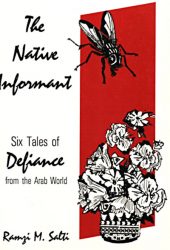 Native Informant:
Native Informant:
Six Tales of Defiance from the Arab World
by Ramzi M. Salti
Published by Three Continents Press
Published May 1994
Literature (short stories)
101 pgs. • Find on Amazon.com
Reviewed by Stephen O. Murray
June 1, 1999.
Half of the stories in Ramzi Salti’s Native Informant: Six Tales of Defiance from the Arab World portray oblique homoerotic desire, though my favorite is a Christian-Muslim (male-female) Romeo and Juliet (in which no one dies), “’Antara and Juliet.” The forbidden love could easily enough be same-sexed.
I see male coupling in the yearning memories of America on the part of a Jordanian returning at/in “The Checkpoint.” His name, Sami, also seems to me composed of the author’s two names, though the author stayed in America and is imagining what might have happened if he had gone back to Jordan. Other interpretations of the dead son’s secret in the opening story, “Vivian and her son,” are possible, but for an openly gay Jordanian-American writer, I’m confident that it’s homosexuality.
The story with direct reference to homosexuality is “The Taxi Driver.” The narrator is shocked by what he perceives as an advance from the driver, Hassan, and then increasingly fascinated by it.
When he goes looking for the driver, he finds that the man has been exposed as a khawal for committing the sin of luwat. Then the narrator starts a journey into books by reading Abu Nuwas…to understand and help Hassan, still not drawing any connection to his own set of desires.
This story shows how great the difficulty of thinking of a self defined by condemned desires is (specifically for Arabs, but it also applies more broadly).

Promotional Image for The Native Informant
The most ambitious story, the title story, is a present-day Passage to India, at least in the charge by an English woman that she was molested by her dusky guide. That he would be extradited is not credible. Indeed, the endings of most of the stories are unsteady and inconclusive (with the exception of a mother burning a “compromising” diary of her dead son’s). The characters do not have racial pride or confidence in the superiority of Arab societies. Unlike the author, many of the characters are Muslim. The author was raised Christian.
The stories are interesting but more as representations of the social nonexistence of homosexuals and the impossibility of gay identity even in an Arab country with a relative lot of exposure to and influence by “the West.”
The style is not striking, but the struggles to consciousness are poignant, and the characters are very believable.
written June 1999
©1999, 2016, Stephen O. Murray
(pre 9/11, post Islamic Homosexualities)

